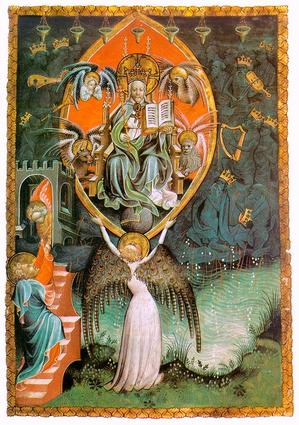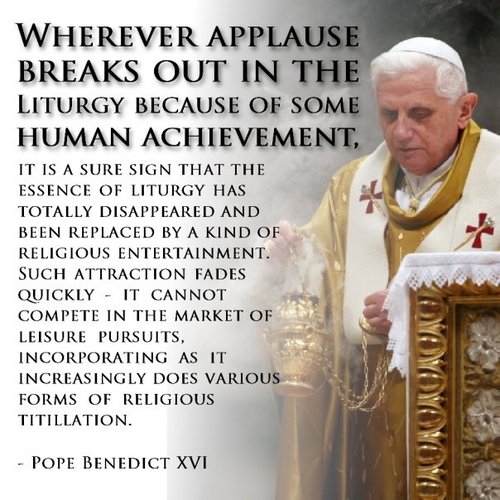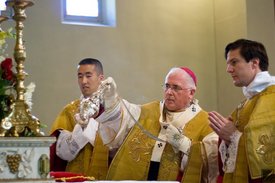Happy New Liturgical Year for the Byzantine Church! Have a blessed 7519!!! The Byzantine Church understands this date to be the years since the creation of the world. A new liturgical year, a new beginning to give God glory, honor and praise!!!!
Tag: liturgy
Britain’s Bishops have no taste
 The UK Bishops’ Conference will be providing the Holy Father –and the Church universal– this sanctuary for the Sacrifice of the Mass and the Rite of Beatification for Cardinal Newman. The the only possible thing to say is: OMG!!!! What rubbish.
The UK Bishops’ Conference will be providing the Holy Father –and the Church universal– this sanctuary for the Sacrifice of the Mass and the Rite of Beatification for Cardinal Newman. The the only possible thing to say is: OMG!!!! What rubbish.
Dedication of the Basilica of Saint Mary Major
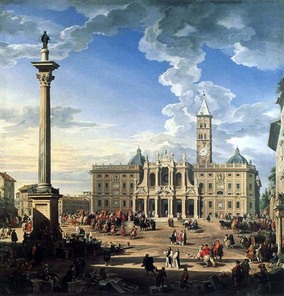 A few times a year the Church’s sacred Liturgy observes a liturgical memorial of a church’s dedication and today is one of those observances. When you get down to brass tax we don’t glorify a building but the action of the Blessed Trinity in the lives of believers.
A few times a year the Church’s sacred Liturgy observes a liturgical memorial of a church’s dedication and today is one of those observances. When you get down to brass tax we don’t glorify a building but the action of the Blessed Trinity in the lives of believers.
The truth of the Liturgy opens the door to salvation
The liturgical wars of the past years are not over, they’re not even close to coming to an end. Too many people have a stake in what will happen with the promulgation of the new Roman Missal in English and then the forthcoming translations of the Divine Office, and sacraments. I look forward to the day when the newly approved psalms get inserted in the daily use of the Church’s rites, especially in monasteries where being in conformity with the mind of the Church is not always a value. Ultimately we have to say that the various “insights”, agendas, ways of doing things and thinking are in conflict with the whole of the Church’s Tradition of continuity. While it is quite fine to be novel in the place where you live and perhaps in the market and work place, no doubt these places rely on new ways of doing things to “spice up life,” novelty has no place in liturgical theology, liturgical texts, rubrics, gestures and homilies. What is often missing in the work of liturgical theology and the praxis of the “faith community” is Christ, the true seeking of God’s face under the power of the Holy Spirit. How is it that we can claim to be one Church, one faith, working out salvation as proposed be Christ and the Church?
For me, Father Roman Guardini sets the stage of what the truth of the sacred Liturgy is and what its virtue is for the believer.
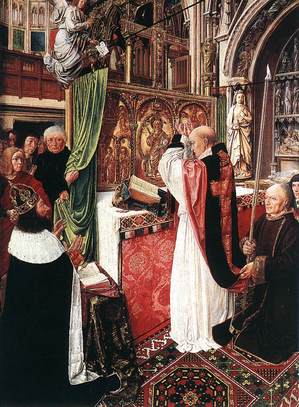 The Church has not built up the Opus Dei for the pleasure of forming beautiful symbols, choice language, and graceful, stately gestures, but she has done it — in so far as it is not completely devoted to the worship of God — for the sake of our desperate spiritual need. It is to give expression to the events of the Christian’s inner life: the assimilation, through the Holy Ghost, of the life of the creature to the life of God in Christ; the actual and genuine rebirth of the creature into a new existence; the development and nourishment of this life; its stretching forth from God in the Blessed Sacrament and the means of grace, towards God in prayer and sacrifice; and all this in the continual mystic renewal of Christ’s life in the course of the ecclesiastical year. The fulfillment of all these processes by the set forms of language, gesture, and instruments, their revelation, teaching, accomplishment and acceptance by the faithful, together constitute the liturgy. We see, then, that it is primarily concerned with reality, with the approach of a real creature to a real God, and with the profoundly real and serious matter of redemption. There is here no question of creating beauty, but of finding salvation for sin-stricken humanity. Here truth is at stake, and the fate of the soul, and real — yes, ultimately the only real — life. All this it is which must be revealed, expressed, sought after, found and imparted by every possible means and method; and when this is accomplished, lo! it is turned into beauty.
The Church has not built up the Opus Dei for the pleasure of forming beautiful symbols, choice language, and graceful, stately gestures, but she has done it — in so far as it is not completely devoted to the worship of God — for the sake of our desperate spiritual need. It is to give expression to the events of the Christian’s inner life: the assimilation, through the Holy Ghost, of the life of the creature to the life of God in Christ; the actual and genuine rebirth of the creature into a new existence; the development and nourishment of this life; its stretching forth from God in the Blessed Sacrament and the means of grace, towards God in prayer and sacrifice; and all this in the continual mystic renewal of Christ’s life in the course of the ecclesiastical year. The fulfillment of all these processes by the set forms of language, gesture, and instruments, their revelation, teaching, accomplishment and acceptance by the faithful, together constitute the liturgy. We see, then, that it is primarily concerned with reality, with the approach of a real creature to a real God, and with the profoundly real and serious matter of redemption. There is here no question of creating beauty, but of finding salvation for sin-stricken humanity. Here truth is at stake, and the fate of the soul, and real — yes, ultimately the only real — life. All this it is which must be revealed, expressed, sought after, found and imparted by every possible means and method; and when this is accomplished, lo! it is turned into beauty.
This is not a matter for amazement, since the principle here at work is the principle of truth and of mastery over form. The interior element has been expressed clearly and truthfully, the whole superabundance of life has found its utterance, and the fathomless profundities have been plainly mapped out. It is only to be expected that a gleam of the utmost splendor should shine forth at such a manifestation of truth.
For us, however, the liturgy must chiefly be regarded from the standpoint of salvation. We should steadfastly endeavor to convince ourselves of its truth and its importance in our lives. When we recite the prayers and psalms of the liturgy, we are to praise God, nothing more. When we assist at Holy Mass, we must know that we are close to the fount of all grace. When we are present at an ordination, the significance of the proceedings must lie for us in the fact that the grace of God has taken possession of a fragment of human life. We are not concerned here with the question of powerfully symbolic gestures, as if we were in a spiritual theater, but we have to see that our real souls should approach a little nearer to the real God, for the sake of all our most personal, profoundly serious affairs.
For it is only thus that perception of liturgical beauty will be vouchsafed to us. It is only when we participate in liturgical action with the earnestness begotten of deep personal interest that we become aware why, and in what perfection, this vital essence is revealed. It is only when we premise the truth of the liturgy that our eyes are opened to its beauty.
The degree of perception varies, according to our aesthetic sensitiveness. Perhaps it will merely be a pleasant feeling of which we are not even particularly conscious, of the profound appropriateness of both language and actions for the expression of spiritual realities, a sensation of quiet spontaneity, a consciousness that everything is right and exactly as it should be. Then perhaps an offertory suddenly flashes in upon us, so that it gleams before us like a jewel. Or bit by bit the whole sweep of the Mass is revealed, just as from out the vanishing mist the peaks and summits and slopes of a mountain chain stand out in relief, shining and clear, so that we imagine we are looking at them for the first time. Or it may be that in the midst of prayer the soul will be pervaded by that gentle, blithe gladness which rises into sheer rapture. Or else the book will sink from our hands, while, penetrated with awe, we taste the meaning of utter and blissful tranquility, conscious that the final and eternal verities which satisfy all longing have here found their perfect expression. But these moments are fleeting, and we must be content to accept them as they come or are sent. On the whole, however, and as far as everyday life is concerned, this precept holds good, “Seek first the kingdom of God and His justice, and all else shall be added to you” — all else, even the glorious experience of beauty.
Father Romano Guardini, The Spirit of the Liturgy (New York: Crossroad Publishing, 1998, p 83ff, reprint of 1930 Sheed & Ward edition, trans., Ada Lane).
No applause at the sacred Liturgy
Independence Day in the USA
A “new liturgical movement” according to Pope Benedict
Some may have heard the idea “the new liturgical movement” used nowadays to describe a recovery of the sacred Liturgy that understands a continuity in the Liturgy that has existed through the ages and not just made up by scholars and hacks. John Allen explores the origin of this idea according to the thinking of Pope Benedict in a brief NCR article, “What Benedict means by a ‘new liturgical movement.’
Trinity Sunday
 Almighty everlasting God, who granted to Your servants, in the profession of the true Faith, to recognize the glory of the eternal Trinity and to adore Its Unity in the might of majesty: we beseech You; that, in the steadfastness of that same Faith, we may always be defended from all adversities.
Almighty everlasting God, who granted to Your servants, in the profession of the true Faith, to recognize the glory of the eternal Trinity and to adore Its Unity in the might of majesty: we beseech You; that, in the steadfastness of that same Faith, we may always be defended from all adversities.
What do we, as Catholics, the Church, believe about the Holy Trinity? Much, in fact. Here are three paragraphs from the Catechism of the Catholic Church:
“The mystery of the Most Holy Trinity is the central mystery of Christian faith and life. It is the mystery of God in himself. It is therefore the source of all the other mysteries of faith, the light that enlightens them. It is the most fundamental and essential teaching in the ‘hierarchy of the truths of faith’. [GCD 43.] The whole history of salvation is identical with the history of the way and the means by which the one true God, Father, Son and Holy Spirit, reveals himself to men ‘and reconciles and unites with himself those who turn away from sin’. [GCD 47.]” (CCC 234)
“The Trinity is a mystery of faith in the strict sense, one of the ‘mysteries that are hidden in God, which can never be known unless they are revealed by God’. [Dei Filius 4: DS 3015.] To be sure, God has left traces of his Trinitarian being in his work of creation and in his Revelation throughout the Old Testament. But his inmost Being as Holy Trinity is a mystery that is inaccessible to reason alone or even to Israel’s faith before the Incarnation of God’s Son and the sending of the Holy Spirit.” (CCC 237)
“The whole divine economy is the common work of the three divine persons. For as the Trinity has only one and the same natures so too does it have only one and the same operation: ‘The Father, the Son and the Holy Spirit are not three principles of creation but one principle.’ [Council of Florence (1442): DS 1331; cf. Council of Constantinople II (553): DS 421.] However, each divine person performs the common work according to his unique personal property. Thus the Church confesses, following the New Testament, ‘one God and Father from whom all things are, and one Lord Jesus Christ, through whom all things are, and one Holy Spirit in whom all things are’. [Council of Constantinople II: DS 421.] It is above all the divine missions of the Son’s Incarnation and the gift of the Holy Spirit that show forth the properties of the divine persons.” (CCC 258)
Scripture is the audible sacrament
Just returning from Rome where I spent 8 days making a personal retreat of sorts that included time in prayer with the monks at Sant’Anselmo, I could not divorce the experience of hearing the Word of God proclaimed frequently throughout the day. Truly, it was a renewing experience of keeping God in front of me. And how else does one live as a follower of Christ but to keep His word and sacrament in front of the self?
New liturgical texts approved by Pope today, Mass to change
The Holy Father addressed Vox Clara during a lunch meeting, and approved the new translation of the 2002 Roman Missal. This is tremendous news. I look forward to praying the new texts! Not a perfect text but one that’s more theologically correct than the current missal. Some work still needs to be done but that ought to be finished shortly so that publishers, musicians, priests, and laity can make the new texts available for the anticipated inauguration for the First Sunday of Advent 2011. Each of the 11 English speaking conferences of bishops will get to work on rolling out the new missal in their countries with the proper catechetical formation for clergy and laity alike. The Pope’s words today:
I thank you for
the work that Vox Clara has done over the last eight years, assisting and
advising the Congregation for Divine Worship and the Discipline of the
Sacraments in fulfilling its responsibilities with regard to the English
translations of liturgical texts. This has been a truly collegial enterprise.
Not only are all five continents represented in the membership of the
Committee, but you have been assiduous in drawing together contributions from
Bishops’ Conferences in English-speaking territories all over the world. I
thank you for the great labour you have expended in your study of the
translations and in processing the results of the many consultations that have
been conducted. I thank the expert assistants for offering the fruits of their
scholarship in order to render a service to the universal Church. And I thank
the Superiors and Officials of the Congregation for their daily, painstaking
work of overseeing the preparation and translation of texts that proclaim the
truth of our redemption in Christ, the Incarnate Word of God.
Saint Augustine
spoke beautifully of the relation between John the Baptist, the vox clara that
resounded on the banks of the Jordan, and the Word that he spoke. A voice, he
said, serves to share with the listener the message that is already in the
speaker’s heart. Once the word has been spoken, it is present in the hearts of
both, and so the voice, its task having been completed, can fade away (cf.
Sermon 293). I welcome the news that the English translation of the Roman
Missal will soon be ready for publication, so that the texts you have worked so
hard to prepare may be proclaimed in the liturgy that is celebrated across the
anglophone world. Through these sacred texts and the actions that accompany
them, Christ will be made present and active in the midst of his people. The
voice that helped bring these words to birth will have completed its task.
A
new task will then present itself, one which falls outside the direct
competence of Vox Clara, but which in one way or another will involve all of
you – the task of preparing for the reception of the new translation by clergy
and lay faithful. Many will find it hard to adjust to unfamiliar texts after
nearly forty years of continuous use of the previous translation. The change
will need to be introduced with due sensitivity, and the opportunity for
catechesis that it presents will need to be firmly grasped. I pray that in this
way any risk of confusion or bewilderment will be averted, and the change will
serve instead as a springboard for a renewal and a deepening of Eucharistic
devotion all over the English-speaking world.
Dear Brother Bishops, Reverend
Fathers, Friends, I want you to know how much I appreciate the great
collaborative endeavour to which you have contributed. Soon the fruits of your
labours will be made available to English-speaking congregations everywhere. As
the prayers of God’s people rise before him like incense (cf. Psalm 140:2), may
the Lord’s blessing come down upon all who have contributed their time and
expertise to crafting the texts in which those prayers are expressed. Thank
you, and may you be abundantly rewarded for your generous service to God’s
people.
